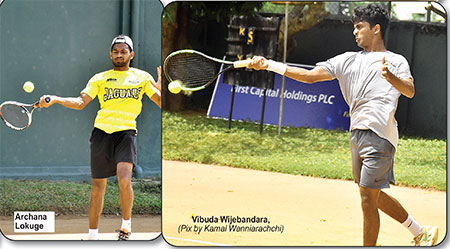Sports
G. Brant Little – Advancement of University Sport
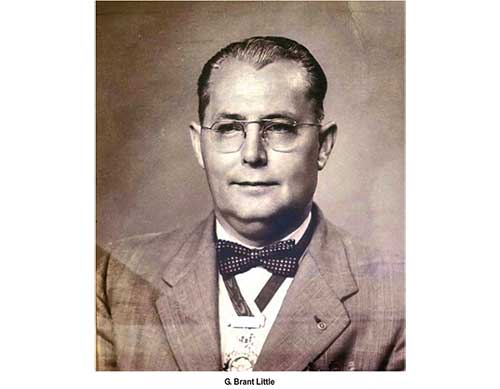
by Fl. Lt Walter. J. May
1948 holds a special place in the history of sport in Sri Lanka due to the outstanding performance of Duncan White at the London Olympics. Earlier that year, G. Brant Little arrived in Sri Lanka (then Ceylon), contracted by the Ceylon Amateur Athletics Association (AAA) to coach the Island’s first Olympic team.
Little’s own sporting background was primarily in athletics having represented Canada in the 800 meters at the 1928 Olympics in Amsterdam. He later won a scholarship to Notre Dame University in USA where he graduated with a Bachelor’s Degree in Physical Education.
After his Olympic mission was completed, Little was appointed as the inaugural Director of Physical Education at the University of Ceylon in 1948. This move hinted as a recognition by the University authorities, particularly the Vice-Chancellor at the time Sir Ivor Jennings, that academic excellence needed to be complemented by participation and success in the field of sport. Sir Ivor also was instrumental in affiliating the University of Ceylon to the All India Inter University Board. This initiative opened the way for sports teams from our University to participate in the annual Inter University competitions conducted by the sporting arm of the Board.
Little’s first major undertaking was the staging of the dual athletic meet between the Universities of Madras and Ceylon. Success in this and later championships was made possible by a very talented group of athletes. The group included athletes of the caliber of John de Saram, Oscar Wijesinghe, Upali Amerasinghe, M.A. Akbar, Lakshman Kadirgamar, T.L. Blaze, D.C. Ariyanayagam and Walter. J. May. In a sequence of years 1949 stands out as the peak year due to two excellent performances. The first was the lowering of all three All Ceylon Relay records on one day (15.10.49) by teams anchored by John de Saram and Oscar Wijesinghe. The other was a resounding win in the All India Inter University Athletic Championships held in Colombo on the 26th and 27th December 1949. The margin of victory was 58 points which in itself was a record. In addition, four new records were established by the Ceylon University athletes. The smooth functioning of the Championships was a testimony to Little’s organizational skills and the runway win a reflection of his coaching ability.
The opening of the Peradeniya Campus in 1952 provided Little with the opportunity and scope to make his most valuable contribution to the advancement of University sport. On his initiative multi-purpose sports complex was built incorporating a cinder track for athletics, tennis, a cricket bowl, rugger and soccer field and a Gymnasium. The Gymnasium was a magnificent building, constructed from the shell of an aircraft hangar – a legacy of World War II. Little used his connections with the Canadian High Commission to secure the hangar. With a floor area of 34m by 71 m it could anytime accommodate one or more court for tennis, basket ball, volleyball, netball, badminton, table tennis and an area for wrestling and weightlifting. It was completed in 1956 and was adjudged by sports professionals to be decades ahead of time.
These sports facilities were put into immediate use with the University staging (for the second time) the All India Inter University Athletic Meet and Boxing Meet in December 1953. Twenty Universities participated in these Games. In athletics, the University of Ceylon maintained its high reputation being runner-up to Punjab University by a mere four points. It won the Boxing Championships decisively.
During Little’s tenure, the groundwork was completed and the pattern was set for the University to participate in All India Inter University tournaments. Teams from most sports thereafter regularly competed in these contests with invariably, encouraging results.
Central to Little’s success on and off the field was his easygoing manner, ability to motivate and organizational skills. At the outset, his outgoing friendly approach to all and sundry required some adjustment on the part of those used to the more traditional reserved British attitude to personal contact. However, it did help to break down barriers by easing the lines of communication and open many doors as was evidence for instance in the special treatment the University received in the Inter University contests at Bangalore and Allahabad.
To many sportsmen and others motivation was his forte. His motivational techniques were many and varied and extended to other sports besides. He was a great supporter of the award of colours and colours nights. For a time, he produced a regular newsletter or column for the newspapers entitled “Varsity Spotlight” which reviewed the main sporting activities at the University for the period and highlighted both team and individual excellence. This not only served as an incentive for enhanced performances but also raised the profile of the University Sport. He also provided support for university sportsmen by attendance at games/events regardless of his familiarity with the sport. He is said to have attended cricket matches resplendent in the University blazer and tie despite his closest acquaintance with a similar ball game being baseball.
There is little need to elaborate on his organizing skills and initiative. The number of sporting activities that he initiated and successfully carried out attest to his capabilities in this regard. His master plan for Peradeniya also called for management and organizing ability of a very high order to bring it to fruition. He was no stranger to innovation and was the first to introduce the concept of the Relay Carnival to Sri Lanka. The first contest of this type was the Inter Hall Relay Carnival in Peradeniya in 1955. The Public Schools Athletic Association adopted this concept a decade later.
The foregoing confirms the invaluable contribution Little made to University sport. His vision and organizing ability was largely responsible for the excellent facilities provided for every sport. In addition, he raised the profile of sport at the University and made it an integral part of University life. There will be a general consensus that University sport made unprecedented and giant strides forward due to his endeavors.
The following observations by a fellow professional (though of later vintage) constitute the most appropriate summing up of Little. He designed a 50 year ahead of its time. A most genial person and a very good motivator. He was an organizer “par excellence.”
-Walter May was the Captain of Athletics of the University of Ceylon in 1971-72.
- News Advertiesment
See Kapruka’s top selling online shopping categories such as Toys, Grocery, Flowers, Birthday Cakes, Fruits, Chocolates, Clothing and Electronics. Also see Kapruka’s unique online services such as Money Remittence,News, Courier/Delivery, Food Delivery and over 700 top brands. Also get products from Amazon & Ebay via Kapruka Gloabal Shop into Sri Lanka.
Sports
Imran steals the show!

(This article by The Island’s respected cricket columnist Rohan Wijeyaratne first appeared in these pages 16 years ago; on the 11th of June 2005. As World Cup winning former captain and current Prime Minister of Pakistan Imran Khan has just visited the island, we reproduce this article in today’s edition)
In my youth – which is to say, quite a long time ago – I would often go to the YMCA canteen for a snack and a tea after whatever business that brought me to the Fort. Doing the same recently more for old times sake than anything else, I saw a familiar figure ahead of me heading in the same direction. Quickening my step and drawing abreast, I introduced myself to the gentleman concerned. He was none other than my old school English teacher, V. Thanabalasingham.
Not just a teacher, but an Institution
Those of you who may have passed through the portals of Ananda College during the 1960s and the early 70s and no doubt been well rounded in many ways, will admit to a man that when it came to the teaching of English, the name Thanabalasingham held no peer. In his prime, he was not just a brilliant teacher but an Institution. And volumes wouldn’t suffice to do him justice – such was the impact he made on all whom he touched, be it with the brilliance of Thackeray, Dickens, Chaucer or the Direct Method English Course that served as our bread and butter in English education at the time.
Another, from a different mould
Another teacher from an entirely different mould was Upali Ratnayake, now the Executive Director of CIMA. At the time he was introduced to us at the ‘A’ level stage, he appeared to our free spirits a cut above the rest. He acquired this status by doing exactly the opposite of what he was expected to do, which was to teach us English as a preparatory step towards an easier passage through University. Upali Ratnayake actually taught us nothing. Yet we learnt a good deal off him, discussing almost everything other than the subject he was paid for! His most endearing virtue was that he never spoke to us from a great height. And in that process, he taught us one of the most lasting lessons in life.
Several decades later, I nearly fell off my chair to receive a phone call from him inviting me to the BMICH on the 28th of May where Imran Khan and Kumar Sangakkara were due to speak at the CIMA Global Leaders Summit. The topics for discussion were “Passion for Perfection” and “Ordinary people in extraordinary acts.” The topics and the speakers seemed irresistible. And so I went.
What a speech!
I wasn’t disappointed. Neither were hundreds of others present. And predictably, Imran stole the show. Blessed with a presence that would have put any Grecian god to second class status, this tall, elegant and immensely handsome man spoke with such brilliance, clarity and articulation, the end result was as gripping as it was inspiring. In his wake, those who followed appeared cumbersome and dreary, almost like how Kenny Mackay would appear after the brilliance of a vintage Sobers or a Dexter! Kumar Sangakkara having to make do with less time than was his rightful share went largely unheard, tending to speak more to his fellow panelists than his audience. He will learn. As a probable hot contender to the top post after Atapattu, there will be many more occasions where he will be required to speak in public.
“Ambition must be upgraded, never downgraded”
Imran was of the view that all humans were endowed with limitless potential. Their limits if any, were often self imposed. Those who achieved extraordinary heights were those who dared to go beyond their self imposed limits. They thought big, dreamed big and did not allow their limitations to get in the way of achieving their dreams. He drew parallels from his own experiences in cricket, his cancer hospital project and his involvement in national politics to establish the point.
The four secrets
Starting with cricket, and drawing parallels with other legends including Zaheer Abbas, Imran stressed the need for a clear vision, the hunger to succeed, the willingness to sacrifice and self belief as being the four secrets to achieve one’s vision. Self belief was a factor which Abbas, despite all his God given gifts, had in very short supply. Imran, on the other hand, was full of it (sometimes foolishly!), because he never thought he ever could lose a game each time he stepped on to a cricket field. He gave many examples of it, including the victories against the might of the ‘invincible’ West Indians in 1986 against all odds. And that, despite having requested and got, ‘neutral’ umpires in a home series in Pakistan! He just wanted to make sure that when they won, there would be none to say that the umpires had anything to do with it!
Drawing from examples of his own life, Imran said that in all one’s life, one would hear others say why something cannot be done. That if accepted, would be the start of everyone’s downward spiral. Ambition he said, must be upgraded, never downgraded. And the more you pit your mind against the winds that resist you from reaching your ambition, the stronger your mind will become. Therefore, ambition must take precedence over everything. And towards achieving that, one should be willing to sacrifice anything. “Compromise” said Imran “for your vision, but never ever on your vision.” Great words!
Why the 3rd world is the 3rd world!
Relating what made him take to politics, Imran said that the problem with the third world was that the ruling elite would put itself above the law and deprive the ordinary folk of any justice. Hence his political movement was primarily meant to establish the rule of law in his country, where the weak and the strong were equal in the eyes of the law. “No society in the history of mankind has ever progressed without the rule of the law. The reason why the third world remained the third world was because it had very poor rule of the law. The elitist types did whatever they wished and got away with it, while the common man and the small and medium industrialist were all deprived of justice.” None could have spoken a truer word!
The ways of the mafia
Imran went on to say that when fighting for the rule of Law, one would be pitted against entrenched vested interests; the most powerful elite in the country. These were those who could buy justice. In Imran’s case, these were men who were also his good friends. Yet he preferred to take on the mantle of a social pariah instead, preferring to stand steadfast to his vision. The mafia usually reacts in such situations in either of two ways. They would either eliminate you or make you join the system. Just five months after his party was formed, he was offered 30 seats in Parliament out of 270. Imran refused, because he realized he had no chance of winning against entrenched political families that controlled his country. He knew the moment he joined them, he would need to compromise with his vision. So he refused, and got wiped out at the elections.
Refusing the Prime Ministership of Pakistan
When General Musharaff took over with Pakistan’s fourth military dictatorship in its brief history, he made all the right noises such as ridding the country of “sham” democracy and so on. No sooner Musharaff formed his own party, Imran was yet again invited, this time to become the Prime Minister of Pakistan. “But when I discovered that joining his coalition meant joining the biggest crooks in the country,” he had no difficulty in refusing. He was chided for his decision by many who argued that he could have joined and then fixed things up. But Imran said the decision was easy to make, as his vision was very clear. And it was one’s vision that decided when to compromise and when not to.
Imran’s vision
Imran’s vision was an independent and credible judicial system in Pakistan. So he asked himself the question, could General Musharaff afford an independent judiciary? The answer to him was obvious. If such a judicial system prevailed, most of the powerful men in his country would be tried for treason under article six of the country’s constitution. The sentence for treason was death. And he was therefore convinced that neither Musharaff, nor those around him could afford an independent and credible judicial system. And so, with his firm “No” Imran watched his party being destroyed yet again, to one seat, in parliament. This time it was by General Musharaff himself.
(To be continued tomorrow)
Sports
Spinners give India early advantage in third Test
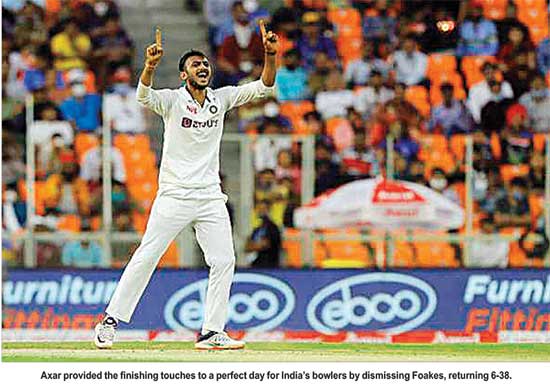
Indian spinners shot England out for just 112 inside two sessions with Ravichandran Ashwin and Axar Patel sharing the spoils after pacer Ishant Sharma opened the floodgates in his milestone 100th match on the opening day of the day-night third Test in Ahmedabad yesterday.
England were all out for 112 in 48.4 overs in the second session on a spin-friendly Motera pitch with Patel (21.4-6-38-6) grabbing his second five-for in his second Test while Ashwin (16-6-26-3) took three.
Openers Rohit Sharma (5) and Shubman Gill (0 ) negotiated five overs to take India to five for no loss at the dinner break.
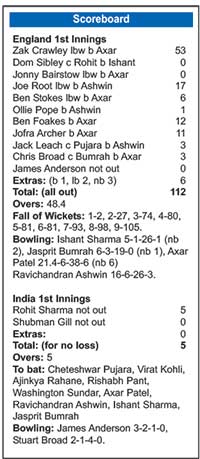 Gill, however, survived after TV umpire ruled him not out in the third over after England claimed for a catch.
Gill, however, survived after TV umpire ruled him not out in the third over after England claimed for a catch.
Ishant, only the second Indian fast bowler after Kapil Dev to play in 100 Tests, fittingly took India’s first wicket in the third over as he dismissed opener Dominic Sibley for nought.
Thereafter, it was all an Ashwin and Patel show as the duo bamboozled the England batsmen to complete the submission, except for the other opener Zak Crawley, who hit an eminently delectable half-century. Six English wickets fell in the second session.
England did not have any substantial partnership with the 47-run stand for the third wicket being the highest. They lost their last seven wickets for just 38 runs.
Crawley’s brilliance was, however, neutralised by the Indian spinners as England were left reeling at 81 for four going into tea after an exciting opening session in the pink ball Test.
Two wickets fell in as many overs after the resumption of the second session, with Ashwin and Patel taking one each, to reduce England to 81 for 6.
Ashwin sent Ollie Pope’s (1) off-stump cart-wheeling with a beauty of a delivery, bowling round the wicket, before Patel trapped Ben Stokes (6) LBW in the next over with a ball that spun in.
Jofra Archer (11) did a tad better as he hit a four in the second ball he faced and another boundary off Ashwin. But, Patel had him soon, cleaning up his off-stump to send England innings into a mess.
England’s rapid slide continued with Jack Leach edging one to the gully where Cheteshwar Pujara took a low catch off Ashwin, though the TV umpire took time to confirm the decision.
Crawley’s effort was the only silver lining for England. Having missed the first two Tests due to a freak wrist injury, the stylish right-hander’s driving was elegance personified as he hit ten boundaries during his 84-ball 53.
Sports
Top players secure third round places
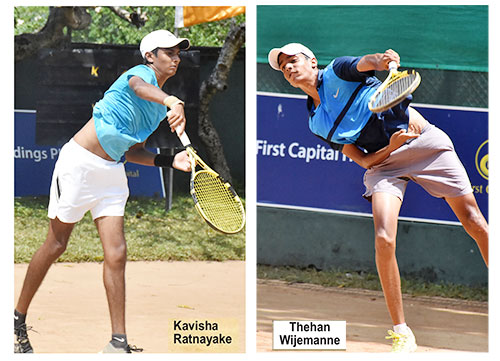
SSC Open Ranking Tennis
Thehan Wijemanne, Kavisha Ratnayake, Vibuda Wijebandara, Savith Weerasinghe, Kiran Viravanathan, Archana Lokuge advanced to the men’s singles third round at the SSC Open Ranking tennis tournament on Tuesday.
Some of the leading players fighting to improve on their impressive performances produced at the Tennis Nationals and the Colombo Championships during recent weeks knocked out their opponents easily to secure third round places.
